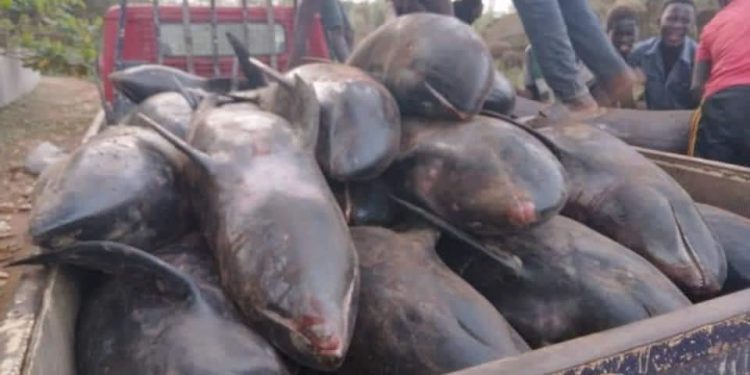The Fisheries Commission’s preliminary investigations into the dead fish washed ashore on parts of Ghana’s coast indicate that stress factors caused the deaths.
Speaking on a sister station, the Head of Fish Health Unit at the Fisheries Commission, Dr. Peter Zedah said further tests are underway for further clarity.
“Our initial investigations have proven that the fishes died as a result of some stress factors. For the [exact] stress factors, we are still investigating.
“Whether they were poisonous or not, we cannot tell because the other people are doing some pesticide testing.”
Dr. Peter Zedah, Head of Fish Health Unit
Mr. Zedah added that his outfit are sending the gills and the kidneys of the dead fish for histopathological analysis.
“When that one [the histopathological analysis] comes, we can say it is confirmatory but for now, the fishes were stressed, and they came [out].”
Dr. Peter Zedah, Head of Fish Health Unit
The assessment showed that the fishes washed-ashore “looked good, so it gives you the impression that maybe some environmental factors may have caused their death.”
Despite the caution against consumption of the dead fish, some fishmongers have been seen processing the fish in Axim.
Experts released 38 dolphins back into sea
Experts from the Environmental Protection Agency (EPA) and the Fisheries Commission have released 38 of the washed-ashore dolphins at Axim-Bewire last Sunday back into the sea.
Officials said an estimated 120 dolphins were washed ashore alive. However, they were weak and unable to swim back to their habitat. Some people picked 29 of the marine mammals to the communities but a search found all of them dead.
Consequently, the experts buried 25 of the carcasses, while the University of Cape Coast took 4 of them for examination.
Mr Arafat Alhassan, Acting Western Regional Director of Fisheries, said they faced fierce resistance from community members in the team’s quest to take over the marine animals.
He said dolphins in the country’s waters are one of the highly protected marine mammals. His outfit has on many occasions, educated fishermen and coastal communities on the need to protect the mammals, he indicated.
“We are surprised that they saw the animals and subjected them to such troubles. From time to time, there are accidental catches, but not to take custody of such volumes ashore.”
Mr Arafat Alhassan, Acting Western Regional Director of Fisheries
The Western Regional Director of the EPA, Mr George K. Diawuoh, said the office are in touch with the security agencies to help in the retrieval of the rest of the mammals from the communities.
He urged members of the communities to help the institutions to ensure that the right things are done in the interest of the people.























